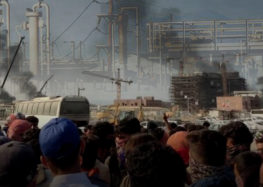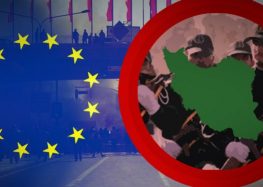Crippling Sanctions
A Growing Crisis: The Impact of Sanctions and Regime Policies on Iranians’ Economic and Social Rights
Crippling Sanctions
US President Obama signed the most consequential component of the sanctions into law on December 31, 2011. The National Defense Authorization Act, which had earlier been passed by both houses of Congress, enjoins the US government to sanction financial institutions of any nation that help to facilitate payment transactions for the sale of Iranian oil by paying the central bank of Iran. Transgressors will be barred from the US financial system, and will face major penalties in the US for violating this secondary US boycott. The administration has the discretion to provide temporary exemptions, at six-month intervals, to purchasers of Iranian oil, who can demonstrate significant reductions in their oil purchases from Iran within each of the allotted six months. In light of the fact that Iran’s other banks had previously been (or were subsequently) blacklisted—and since “over 35 percent of international transactions are in dollars, [with] many of them . . . not involv[ing] American firms,”[90] this law provides the US government with a tremendous amount of leeway in gradually choking off Iran’s primary source of expenditure and hard currency.
The impact of the National Defense Authorization Act was amplified by the almost simultaneous decision on the part of the European Union to impose a total EU-wide embargo on the purchase of Iranian oil as well as a freezing of the assets of the Iranian central bank. The decision to ban the purchase of Iranian oil, accompanied by the resolve to desist from insuring Iranian oil shipments, was made on January 23, 2012, by the 27 member states of the EU, and started being fully implemented on July 1, 2012.[91] In addition, on January 23, effective immediately, the EU froze the assets of the Iranian central bank. It also imposed a blanket prohibition on the trade in gold as well as other precious metals with Iran’s central bank (and other public institutions).[92]
Although EU member states imported roughly one-fifth of Iran’s total exports, their decision to switch to alternative sources of petroleum, along with America’s sanctioning of Iran’s central bank, has proved quite harmful to the economic interests of the Islamic Republic—and even more inimical to the socio-economic well-being of the Iranian people. As a result of the joint US/EU sanctions, not only has Iran not been able to find alternative customers for the oil that it previously sold to the EU, but its other major customers, including China (which had taken roughly 20% of Iran’s oil exports), India (40%), South Korea (38%), and Turkey (20%), have all cut-back on their purchases of Iranian oil in order to gain reprieves from the US sanctions law.[93] Moreover, they are likely to continue to diminish their reliance on Iranian oil in order not to run afoul of American sanctions. At the same time, they are also likely to demand discounts for the diminished volume of imports from Iran.
Furthermore, the decision on the part of the EU to prohibit its companies from providing maritime insurance for Iranian oil shipments has imposed additional costs on the nation, particularly in light of the fact that European insurance companies (most of which are based in London) underwrite more than 90 percent of global petroleum shipments.[94] In fact, even before the imposition of the 2012 sanctions, an increasing number of insurance and shipping companies, and not just those catering to the oil industry, had decided to go beyond the letter of the law and abandon the Iranian market. In all likelihood this reflected the fear that, given the increasing domination of the Iranian economy by the state’s security apparatus, continued transactions with Iran would sooner or later cause them to conduct business with individuals and entities blacklisted by the US and its EU partners and expose them to penalties. Before entirely terminating services to Iran in 2012, the world’s largest shipping company, Maersk, which delivered mostly food products to Iran, stopped calling on Iran’s three largest ports in 2011 because the Iranian company that had been entrusted with the task of managing these ports was purported to be affiliated with the IRGC.[95] The dwindling numbers of secondary shipping companies that are still willing to transport cargo of any type to and from Iran charge at least three times the amount that they used to prior to the imposition of the 2012 sanctions.[96] These costs have been highly destructive for importers and exporters, and are subsequently passed on to the Iranian people.
The objective behind the comprehensive US/EU sanctions was to initiate the process of choking off Iran’s main revenue stream, while expanding the imposition of costs on the Iranian economy, in order to compel Iran to abide by UNSC resolutions on Tehran’s nuclear program. To this end, other costly sanctions were imposed on Iran in 2012. The timing could not have been worse for Iran, because increased oil production in the US, Iraq, Saudi Arabia, and Libya was able to compensate for the loss of Iran’s oil. Perhaps the most costly of these was the March 2012 EU Council decision to refrain from providing services to virtually all of Iran’s banks, including the central bank of Iran.[97] In the words of an informed economist, “The closing down of Iran’s access to the SWIFT system was significant. This may have done more damage to Iran’s ability to do business internationally than many of the other sanctions combined. The sanctions focused on persons and banks are good politics, but have historically not been effective. Closing the country from a major clearinghouse is like slamming a large financial door in their faces.”[98]
In August 2012, the US passed the Iran Threat Reduction and Syria Human Rights Act, which placed virtually all of Iran’s transportation, energy, and financial sectors under US sanctions.[99] Meanwhile, in October 2012, the EU imposed an additional set of sanctions against Iran. Following the lead of the US, “the measures prohibit any transactions with Iranian banks and financial institutions unless specifically authorized or exempted, such as for humanitarian purposes. The import, purchase, and transport of natural gas from Iran was also banned, as was the construction of Iranian oil tankers and cargo vessels.”[100] The EU also banned the export of base metals, particularly steel, which directly affected Iran’s shipbuilding and transportation industries. The resulting 100 percent increase in the price of steel in Iran inflicted a severe blow to the country’s construction industry, which employs a large number of workers.[101]
In its most recent round of US sanctions against Iran, passed by the Congress and signed into law by President Obama as part of a defense spending bill at the beginning of 2013, the US has intentionally extended sanctions to crucial Iranian industries, including the construction sector. In the words of executive director of the Foundation for the Defense of Democracy Mark Dubowitz, as quoted in the Washington Post, “This is effectively blocking whole sectors of the Iranian economy. . . . The goal is to create a chilling effect on all non-humanitarian commercial trade with Iran.”[102] In addition to prohibiting foreign companies from conducting interactions with Iranian shipping, energy, and financial firms, the law seeks to undermine Iran’s ability to barter its oil for precious metals. Scheduled to come into effect within 180 days after its passage, the law is, as Mohammad Hossein Ashrafi, a member of the National Security and Foreign Policy Commission of the Iranian Majlis said, as reported by Radiozamaneh, an important step in the seemingly inexorable direction of transforming US sanctions into an “oil in exchange for food” program.[103] Once fully implemented, the sanctions will bar foreign countries and entities from enabling Iran to use the proceeds from the sale of its oil for non-essential/humanitarian (as deemed by the US) products and commodities. According to the Christian Science Monitor, Undersecretary for Terrorism and Financial Intelligence David Cohen said that the US Treasury began implementing sanctions on February 6, 2013, with the objective of causing “Tehran’s oil revenues to become ‘shackled’ within any country buying oil from Iran.”[104] Moreover, the law also targets the nation’s highly labor-intensive automotive and construction industries by preventing Iran from importing steel, coal, and aluminum. As such, these sanctions cap the trend of transforming targeted and “smart” sanctions aimed at the regime and its ruling elite into a comprehensive embargo against the country and its inhabitants.
As reported in Iran Primer, David Cohen observed on July 31, 2012, that “one of the collateral benefits of the financial sanctions that we have imposed is that it is increasingly difficult for Iran today to make payments in the international financial system. That makes it difficult for Iran to procure material for its nuclear program.”[105] The sanctions, however, have also made it prohibitively expensive for Iran to acquire the financial, banking, and insurance services it requires for the conduct of its non-nuclear related trade and commerce.
Thus the inordinate costs that the post-2012 sanctions impose on Iran, combined with their ability to cut the country’s primary source of income and foreign exchange earnings by more than half, make them qualitatively different from the sanctions that came before 2012. Unlike the previous rounds of sanctions, the new round has in relatively short order managed to exact a severe toll on the livelihoods of the Iranian people, as Iran is now largely bereft of the ability to mitigate the impact of its faulty policies and the costs of the previous sanctions. Indeed, these sanctions have turned a worsening economic condition into a critical one, bringing about a rapid and precipitous plunge in the standard of living of all wage earners. Inflation and unemployment have become severely exacerbated, and access to healthcare and education has been significantly harmed.
[90] “Dollar Power,” Economist, June 23 2012. See also Kevin Baxter, “Starving Tehran of Cash,” Middle East Economic Digest, January 13, 2012.
[91] “Q & A: Iran Sanctions,” BBC News, October 16, 2012, http://www.bbc.co.uk/news/world-middle-east-15983302.
[92] Ibid.
[93] Margaret McQuaile, “Iranian Oil Sanctions,” Platts, December 6, 2012, http://www.platts.com/newsfeature/2012/iran/index.
[94] See “Is Sanctioning Maritime Insurance the Most Painful Sanction Against Iran?,” BBC Persian, July 2, 2012.
[95] See “Why Are Iran Sanctions Affecting Foodstuff?,” BBC Persian, June 30, 2011.
[96] International Campaign for Human Rights in Iran interview with an Iranian exporter, who does not wish to divulge his identity.
[97] “Global Financial Service Cuts Off Iran,” Iran Primer, March 15, 2012. http://iranprimer.usip.org/blog/2012/mar/15/global-financial-service-cuts-iran. See also “Dollar Power: America Is Using the Dollar To Hurt Iran. Will It Work?,” Economist, June 23, 2012.
[98] Paul Sullivan, “Panic In Tehran,” Lobe Log, October 4, 2012, http://www.lobelog.com/panic-in-tehran/.
[99] See “2012 Iran Sanctions Report,” PAAIA, August 2012, pp. 6-8. See also “Russia Slams New US Sanctions,” Associated Press, August 13, 2012.
[100] “Q & A: Iran Sanctions,” BBC News, October 16, 2012, http://www.bbc.co.uk/news/world-middle-east-15983302.
[101] See “The EU ‘Broke the Back of the Construction Industry in Iran’ In One Month,” Radiofarda, November 12, 2012.
[102] Joby Warrick, “New Iran Sanctions Target Industry in Bid For Deal Curbing Nuclear Program,” Washington Post, January 6, 2012, http://articles.washingtonpost.com/2013-01-06/world/36208214_1_new-iran-nuclear-program-mark-dubowitz.
[103] See Iran’s MP Says US Sanctions Reaching Critical Stage,” Radiozamaneh, January 6, 2013.
[104] Roshanak Taghavi, “As IAEA Arrives In Tehran, Iran Braces For Full Force of US Sanctions,” Christian Science Monitor, January 15, 2013.
[105] “Part II: US Assesses New Sanctions,” Iran Primer, August 1, 2012.







